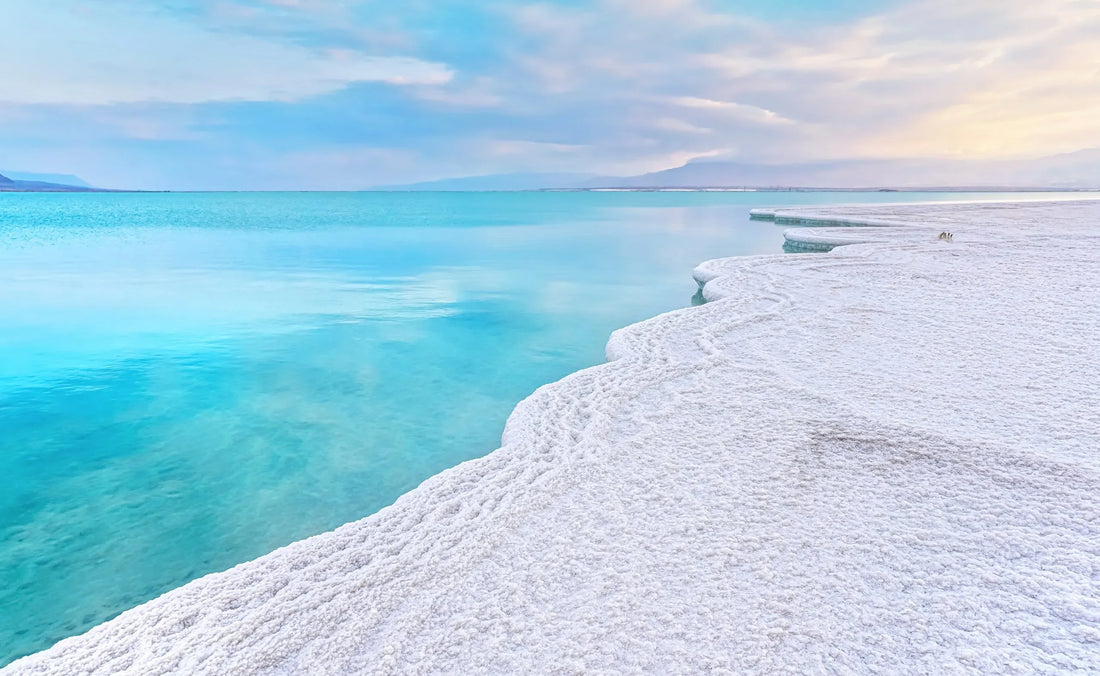
In this article we go through the questions including is sea salt carcinogenic or anti-cancer? What are the 6 therapeutic properties of Urmia salt? As well as the difference between sea salt and table salt.
Sea Salt
Sea salt is a type of salt derived from the evaporation of seawater. It's typically less refined than regular salt and has larger grains. This salt has coarse grains and contains minerals like zinc, potassium, and iron. The presence of these minerals affects the taste and properties of sea salt. Adding it to various foods provides a different experience of salt consumption due to both its taste and the size of its grains being completely different from the regular salt you might usually use.
Salt in the human body is as crucial as water and oxygen. In fact, each of us contains about four to eight ounces of salt in our bodies. Salt balances the blood volume and regulates the water in the body's tissues and cells. It's also essential for the formation and proper function of the nervous system and plays a fundamental role in digesting food and ensuring the heart functions properly.
Studies on sea salt have shown that it contains natural iodine necessary for the body, and consuming sea salt with natural iodine contributes to overall human health.
Compared to regular salt, sea salt contains more minerals, offers a better taste and texture, and is considered healthier.
Why doesn't sea water spoil?
The salinity of the sea is crucial, preventing it from becoming drinkable or suitable for cultivation. The presence of various salts, particularly table salt, contributes to its saltiness. The resistance of salty water to spoilage is higher than that of freshwater. If the oceans were fresh, they'd be at a higher risk of spoilage and putrefaction. If sea water were to become spoiled, very few forms of life on Earth would survive. Foul and putrid water won't sustain living organisms.
On average, the salinity of oceans and seas is around 3.5% (35 grams per liter). This comprises dissolved salts, primarily sodium and chloride ions, which maintain an average density of 1.025 grams per liter, preventing the water from putrefying.
Interestingly, if seawater weren't salty, no human could survive its putrid smell. Given that most of Earth's surface comprises oceans and seas, it's been said that salt is essential to prevent putrefaction.

The benefits of sea salt for the body are numerous:
High-quality sea salt has astonishing benefits for our health.
- Body Hydration
- Reduced Fluid Retention
- Electrolyte Balance
- Prevention of Muscle Cramps
- Skin Health Support
- Enhanced Digestion
- Blood Pressure Regulation
- Asthma Improvement
Characteristics of Sea Salt
Characteristics of Urmia Lake Salt
- Contains natural iodine
- Completely natural and rich in minerals
- Free from chemical substances and heavy metals
- Has a warm and dry temperament
Benefits of Urmia Lake Salt:
- Improves brain function
- Balances body electrolytes
- Regulates blood pressure
- Enhances digestion
- Beneficial for the skin
- Energizing and calming for the body
- Acts as a body detoxifier
- Maintains heart and vascular health
6 important therapeutic properties of Urmia Lake Salt
If the sea salt you consume, including real and natural salts like Urmia Lake salt, it will have numerous health benefits for you and should be consumed daily. Why?
From a nutritional perspective, this salt contains the following properties:
- Rich in minerals
- High quality sea salt usually contains around 60 types of minerals.
- The best salt on Earth, Himalayan sea salt, comprises 84 types of minerals.
- Sea salt is considered a source to supply the body's essential minerals.
- It prevents dehydration and helps balance body fluids.
- With daily consumption of Urmia Lake Salt, the sodium and potassium in your blood are regulated.
- Sodium and potassium are two electrolytes in the body that, together, balance the fluid within body cells, blood plasma, and extracellular fluid.
The benefits of Urmia Lake Salt include:
- Better skin protection
- Healthier teeth
- Relief from arthritic rheumatism
- Muscle cramp alleviation
- Psoriasis and joint inflammation relief
- Sea salt aids in acne and sinusitis relief.
- Useful for skin exfoliation, nasal and eye rinsing, and body electrolyte balance.
- Sea salt is an excellent electrolyte source.
- Electrolytes have various roles in the body, from regulating heartbeats to allowing muscle movement. Consuming Urmia Lake Salt prevents electrolyte imbalance, which, in some cases, can lead to life-threatening symptoms.
Magnesium present in Urmia Lake salt
Magnesium is the second most abundant element within cells and the fourth positively charged ion in the body. It helps regulate over 325 enzymes and plays a crucial role in bodily functions such as muscle control, energy production, and toxin elimination. A lack of magnesium can lead to increased risk of heart diseases, strokes, osteoporosis, swelling and joint pain, gastrointestinal discomforts, stress-related illnesses, and chronic fatigue.
Does sea salt help in skin rejuvenation?
Did you know that sea salt can make you independent of buying various expensive lotions and creams for beautiful and clear skin? Just try it once.

The benefits of Potassium and Magnesium in sea salt
Benefits of Potassium in Sea Salt
- Potassium helps food get into the body's cells and removes waste from inside the body's cells.
- Nerve signal transmission from one cell to another occurs through potassium.
- Potassium, present in natural salts alongside sodium, creates and regulates the body's acid-base balance.
- Potassium, in collaboration with phosphorus, delivers oxygen to the human brain.
- Potassium, along with calcium, regulates nerve and muscle communication, enabling muscles to contract and relax, allowing movement or stillness, and managing all other muscle functions.
- Severe potassium deficiency can lead to a stroke, kidney problems, infertility, overall body weakness, increased blood pressure. Furthermore, its shortage causes the body to increase sodium levels to compensate for it
Benefits of Magnesium in Sea Salt
This vital substance is found in pumpkin seeds, sesame, wheat bran, and barley. Its deficiency can lead to asthma, loss of appetite, migraines, slow growth, changes in the heart's rhythm, muscular and nervous issues, seizures, depression, muscle weakness, dry skin, and dizziness, among other things.
Industrial salt harms
- Contains explosive suppressants and is a type of toxin.
- Contains derivatives of aluminum.
- Contains other chemical additives.
- Causes an increase in your blood pressure.
- Undermines health claims to increase your weight for the benefit of some and leads to the accumulation of fat in your body.
One of the major differences between sea salt and regular salt
is their mineral content which is rich in minerals such as
The astonishing benefits of sea salt:
This substance can replace a few medications and assist with 15 diseases!
Natural sea salt is healthy and possesses therapeutic properties. However, before diving into its benefits, it's important to note that it forms through the natural process of evaporating salty water, ensuring that all its elements are preserved during this time.
Due to its composition of over 80 elements, sea salt has miraculous effects on skin and hair health.
The most significant difference between sea salt and table salt is that table salt is dried up to 650 degrees, altering its chemical structure. Therefore, it doesn't contain the necessary elements and minerals as natural salt does.
Sea salt contains 80 different trace elements like potassium, magnesium, and manganese, leading to wonders for your health, skin, and hair.
Sea salt has an alkaline effect, aiding in balancing the body's acid levels, hence reducing potential risks of deadly diseases.
Sea salt can bolster the body's immune system, making it resilient against various self-immune diseases such as the flu, allergies, and similar conditions.
Sea salt has significant effects on the cardiovascular system. Scientists have shown that regular consumption of dissolved sea salt in water can significantly reduce the levels of "bad" cholesterol,LDL, in the body.
Moreover, it helps maintain your blood pressure and normalizes irregular heartbeats. Metabolic disorders like diabetes can be successfully treated, and sea salt aids in reducing blood sugar levels.
Over 20% of sodium in our bodies accumulates in damaged bones due to mineral deficiencies in the blood and bodily fluids. Adding sea salt to your diet can prevent and treat bone fragility.
Sea salt is beneficial for the respiratory system, aiding in improving mucous membranes due to its mineral content, trace elements, and structural components of seaweed containing seawater.
Sea water possesses mild disinfecting and antibacterial properties attributed to its calcium and magnesium ions. It's a good source of potassium, which facilitates the function of muscle fibers, making sea salt useful for cramps.
Considered a natural blood purifier, sea salt contains significant amounts of vitamin C, acting as an antioxidant to eliminate free radicals.
Dr. Josh Axe discusses the drawbacks of industrial salt and the benefits of edible rock salt and sea salt.
The benefits of edible rock salt and sea salt and their impact on body health
Properties of Urmia Lake Salt
Let's receive healing from nature!
Click here to purchase sea salt!




